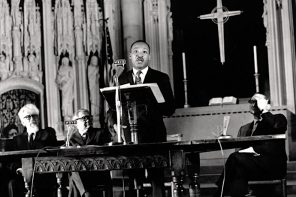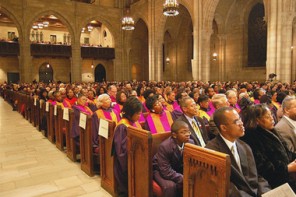Decades ago when the famed and controversial pastor of Riverside Church Harry Emerson Fosdick and legendary theologian Reinhold Niebuhr were New York celebrities and national symbols of Protestant liberalism, mainline Christianity in America was a potent force in American public life. At that time, the superstars of progressive religion had the ear of America’s power elite: corporate executives, heads of state, and heads of industry. They were the epitome of what, at that time, represented White Anglo Saxon Protestant [WASP] dominance, i.e. white privilege.
Today, the white privilege of those men and that era continues unabated. However, the power and influence of protestant liberalism has all but died. In America today, liberal Protestantism exists in a persistent vegetative state. Nowhere is this more evident than in the recent resignation of Dr. Brad Braxton, the now ex-pastor of Riverside Church, NYC.
Dr. Braxton’s resignation, after a controversial nine months, is symptomatic of a deep theological and ethnic dilemma among progressive Christians. This dilemma, which is spelled out in terms of race, class, and culture, is far from new, having plagued the progressive Christian tradition since its emergence in the early 19th century. From abolitionism to liberation theology, an uneasy relationship has existed between literate and so-called enlightened Christians and people of color; especially people of color who are in one way or another connected to or influenced by populist and charismatic religion.
Although progressive Christians have been allies of America’s outcast populations, such alliances have not precluded progressive Christians from being cultured despisers of the cultures of the oppressed. Hence, the alliances between progressive Christians, especially progressive whites and disinherited blacks, have always been conflicted and constrained. And even when progressive black Christians who are literate and credentialed find themselves in the same company as progressive white Christians with similar status, the racial and background differences (not to add racial anxiety) do not disappear.
From a distance, I have watched with intrigue and no surprise the tensions that accompanied Dr. Brad Braxton’s short tenure at Riverside Church. Less than ten years ago, I found myself in a similar situation in a seemingly progressive majority white congregation in Nashville, Tennessee (though I was not a senior minster but an associate). Working alongside a senior minister, my duties included preaching and administering the sacraments. Like Brad Braxton, I considered myself a progressive Christian yet I was told that my preaching was conservative. After my departure, I learned that my cultural style of doing worship was not celebrated by all. My preaching was perceived in conservative terms because it did not conform, absolutely, to the dominant politics that governed the congregation that I was a part of.
In this congregation, identity politics of every sort: feminist, gay/lesbian, and black were alive and center stage. My preaching was perceived as conservative because I did not revel in the generational struggles and political beliefs that so shaped that particular congregation. While I am quite familiar with the struggles of the 1960s and ’70s (and in many respects made those struggles my own), I sought theologically, and in my own way, to transcend them. In no way did I pretend to deny or minimize the struggles of that era; the injustices that the boomer era sought to overcome were and continue to be very real.
However, I was shaped by a preaching tradition, the Black Baptist tradition (a conservative tradition), that reveled in the resurrection, the triumphant side of Christianity. In the Black Baptist tradition that shaped me, the triumphant side of the cross is connected to celebration and excitement, to overall enthusiasm. An enthusiastic and celebratory faith does not allow inequality, victimization, and suffering (and the seemingly unresolvable and conflict-ridden politics that accompanies them) to have the last word. My conservative preaching tradition would not allow it.
Historically, celebration and excitement have not been valued traits among mainline progressive Christians, especially mainline white Christians. In contrast to the conservative and populist wing of American Christianity, progressive Christianity extols the values of rationalism, discursive preaching, and sedate religious posturing. Historically, enthusiastic and conservative Christianity has been stereotyped as primitive and backwards.
Historically, such Christianity, which is today associated with Charismatic and Pentecostal Christian groups, has thrived among the least educated, the least wealthy, and the least privileged groups in America. The single population where it has most thrived and is quite visible is America’s black population. When you are a theologically-educated black minister in a predominately white congregation, you become the object of racial, class, and cultural condescension if your preaching and style of worship are in any way connected to this strand of American Christianity. When the congregation is affluent, it only heightens your dilemma.
In very blatant terms, Dr. Brad Braxton was simply too ethnic (or too black) and too charismatic for Riverside Church. This holds true despite the fact that Braxton was preceded by Dr. James A. Forbes, a black minister with a Pentecostal background. Although he aligns himself ideologically with the progressive wing of Protestant Christianity, he bears the marks of a preaching and leadership tradition that is culturally and psychologically challenging to mainline white privilege. Although Braxton’s progressive leanings cast him as a minority in the ethnic Christian communities that have impacted him, it is hard to image those tensions, which invoked his resignation from Riverside, as issues among those communities.
To be sure, those communities have their own baggage. However, I highly doubt that his gifts as a minister would be contested in the manner that it was at Riverside Church. If anything, Braxton’s tenure at Riverside was an opportunity for progressive Christianity to reinvent itself. What Braxton offers to progressive Christianity is what Barack Obama offers to political liberalism: new life. Because they remain connected to ethnic and religious streams of American life held by many mainline Protestants and American secularists in derision, they bring new life to traditions that are seemingly on their way to public extinction.
In a word, progressive Christianity is in need of saviors. Their salvation may rest in the hands of the stereotypically primitive and cathartic world of non-white and non-mainline churches. Progressive Christianity may have lost a savior the day Dr. Brad Braxton resigned from Riverside Church.



